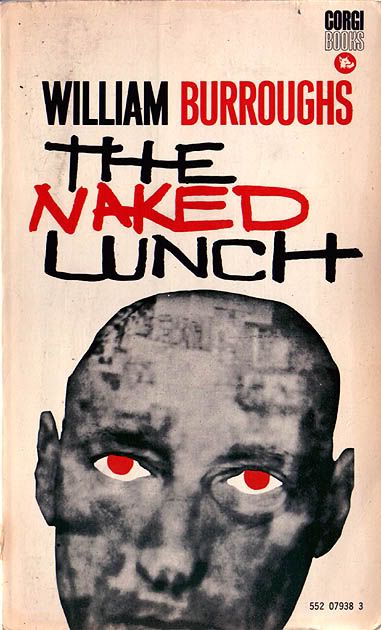William Burroughs: Naked Lunch

To the canny reader, or to the canny attender-of-high-school, this probably seems like it should have a parenthetical admission that I also loved FEAR AND LOATHING IN LAS VEGAS, THE ELECTRIC KOOL-AID ACID TEST, and REQUIEM FOR A DREAM. Well, I've never read those books, so (although I'm sure my parents were terrified that this was the case) I was not a "drug literature" fan, although I probably would have been friends with that kid. I think by the end of this list, you will see that I was nothing so nearly coherent as that. Coherence, which you could almost translate as "predictability," was my motto in college; I wanted everything to fit together into one monolith of perfect taste, each piece accommodating every other one. Well, that is no longer seems a sensible goal, and I am nostalgic for a time when I would have read a bunch of unrelated books in a row and thought nothing of it. In any case, NAKED LUNCH was perfect for me, because it was hilarious and subversive but not particularly upsetting ("dated" is probably the word I'm looking for) to my 17-year old sensibilities. That is, I could read it fairly carelessly, missing or misunderstanding most of the less-savory sexual parts and political context. Maybe I should look at it again, but I'm not sure I would even know what to do with it at the present moment.
Livy: The War with Hannibal

This I relate to a bit more, since Hannibal was Freud's idol, a melancholy figure of ambition thwarted, and Freud relates several dreams that feature Hannibal and his family (Hasdrubal and Hamilcar). Although, not being Tacitus (or Herodotus), Livy is a bit dry, and the most-exciting parts tend to be given the same narrative attention as boring tribunal elections, this is a great story and the magisterial/bureaucratic tone is perfect for Rome's side of the telling. It's broken up by year (the length of the consular term), and extracted from Livy's larger HISTORY OF ROME, but totally stands on its own, with a narrative arc and good guys/villains not dissimilar to PARADISE LOST. Now, in *this* case, one would be correct in assuming that I read a ton of other books in this genre: Tacitus' HISTORIES, Quintus Curtius Rufus' HISTORY OF ALEXANDER, Herodotus, Polybius, etc. Aside from Tacitus, this is probably the best, and it's unfortunate that I will probably never meet anyone who has read this book who isn't the biggest Classical Studies geek.
William S. Shirer: Collapse of the Third Republic

Having read THE RISE AND FALL OF THE THIRD REICH in eighth grade, I naturally had to read its "sequel," which really is a much-expanded version of events from the middle of the earlier book. Like that (equally massive) tome, THE COLLAPSE OF THE THIRD REPUBLIC answers a question: Why was Europe's most powerful country destroyed in a nearly-bloodless war in a matter of a few weeks, after having won The Great War in a brutally long but eventually decisive way? The best parts of this book are the "closet dramas" that Shirer replays from transcripts of cabinet meetings, the interference of mistresses in policy, and the constant threat of Bonapartism to the Republic. Ultimately, it drags a bit, lingering on the politics of the 1930s for a good part of the middle, sandwiched between the long and exhilarating summary of the 1870-1918 period, and the period of Hitler's aggression from 1936. Nonetheless, one can hardly think of a more interesting subject than the complete, abject and sudden collapse of the world's "most civilized" country---unless that subject were the further embarrassment of collaboration and Vichy, about which I would very much like to read.


No comments:
Post a Comment